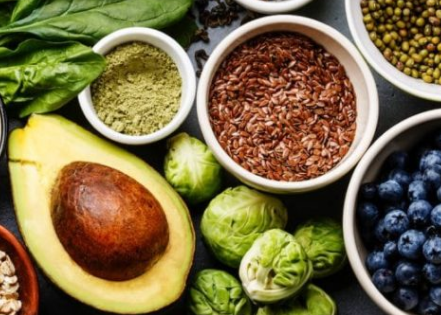
31 Mar 2025 Himalayan Yoga Academy
Fats provide a concentrated source of energy that is essential for the body. Generally, fats are associated with obesity, which is a misconception. There are healthy fats and unhealthy fats. The healthy fats are one of the essential parts of a balanced diet. Healthy fats are beneficial for providing energy, absorbing nutrients, and proper functioning of the brain. There are healthy fats for vegetarians as well as for non-vegetarians. Consuming healthy fats in meals proves beneficial, which vegetarians can obtain from plant-based or dairy-based goods. This article covers healthy fats for vegetarians, including their benefits and potential drawbacks.
Types of Fats
| Types of Fats | Explanation | Example Sources |
| Saturated Fats | Fats are normally solid at room temperature. The excessive use increases LDL (bad) cholesterol, which raises the risk of heart disease. | Vegetarian: Butter, cheese, and full-fat dairy goods Oils (coconut oil, palm oil) Non-Vegetarian: Red meat (buffalo, pork, goat), Chicken, eggs |
| Trans Fats | Artificial fats are produced through hydrogenation. The risk of heart disease significantly increases as the bad cholesterol (LDL) rises and good cholesterol (HDL) lowers. | Processed snacks, fried foods, baked goods (cookies, cakes), margarine, fast food, packaged foods |
| Unsaturated Fats | Healthy fats that are in a liquid state at room temperature. Moderate consumption helps reduce bad cholesterol levels and lower heart disease risk. Two types: monounsaturated and polyunsaturated fats. Polyunsaturated fats include both Omega-3 and Omega-6 fatty acids. | Monounsaturated Fats: Avocado, Oils (Olive, Peanut oil), Nuts (almonds, cashews), Seeds (pumpkin, sesame) Polyunsaturated Fats: Vegetarian: Flaxseeds, chia seeds, walnuts, soybean, sunflower oil Non-Vegetarian: Fatty fish (salmon, mackerel, sardines) |
Suggested: Is Vegan Food Always Healthy?
Healthy Fats for Vegetarians
Plant-based and dairy products are sources of healthy fats for vegetarians. They are very rich in unsaturated fatty acids, antioxidants, nutrients, and vitamins that are best for overall well-being. Avocados, nuts, seeds, and plant oils are some ample sources of healthy fats.
Healthy Fat Sources for Vegetarians
| Food Sources | What We Get |
| Avocados | Rich in vitamins A, D, E, and K, High in monounsaturated fats and fiber |
| Nuts and Seeds (e.g., almonds, walnuts, chia seeds, flaxseeds) | Good sources of Omega-3 fatty acids, protein, and fiber |
| Olive Oil | Great source of monounsaturated fats and anti-inflammatory |
| Coconut Oil | Contains medium-chain triglycerides (MCTs) providing quick energy |
| Nut Butters (e.g., almonds, peanuts, etc.) | Good source of healthy fats, protein, and fiber |
| Quinoa | Rich in high-calorie and high-protein |
| Tofu | Excellent source of monounsaturated and polyunsaturated fats |
World Health Organization Fat Consumption Recommendations
The World Health Organization (WHO) recommends consuming a balanced and moderate healthy fats to maintain overall health.
| Types of Fats | Intake Recommendations |
| Total Fats | 10% to 35% of total daily calorie |
| Saturated Fats | Less than 10% of total daily calories |
| Trans-Fats | Less than 1% of total daily calories (as low as possible) |
| Unsaturated Fats | Majority of fat intake should come from unsaturated fats |
Benefits of Consuming Healthy Fats
- Supports Brain Health: Omega-3 fatty acids are vital for cognitive function, which helps improve memory and focus.
- Boosts Heart Health: Unsaturated fats, especially omega-3s, help reduce the risk of heart disease by lowering bad cholesterol levels.
- Enhances Nutrient Absorption: Healthy fats absorb fat-soluble vitamins (A, D, E, K), which are essential for various bodily functions.
- Provides Long-Lasting Energy: Healthy fats provide a firm and constant energy source, keeping you active for longer hours.
- Supports Hormone Production: Healthy fats support in production of vital hormones like estrogen, testosterone, and cortisol essential for body functioning.
- Weight Management: The moderate consumption of healthy fat helps in controlling obesity.
- Promotes Healthy Skin: Healthy fats minimize the risk of dry skin and other skin conditions and maintain skin elasticity and hydration.
- Rich in Antioxidants: Many plant-based fats are rich in antioxidants and added vitamins and minerals that support overall health.
- Reduces Inflammation: Some plant oils have anti-inflammatory properties that are beneficial to minimize the risk of chronic diseases like arthritis.
- Improves Mood: Healthy fats support the production of neurotransmitters like serotonin, which regulate mood and stress levels, enhancing better mental health.
Contraindications of Consuming Healthy Fats
- Consuming high-calorie foods in high quantity is not good for health.
- Coconut oil consumption can cause digestive issues for some people.
- Consuming heavily processed forms of healthy fats like olive oil or nuts can lose their benefits, reducing their nutritional value.
- Some people may have allergies or sensitivities to specific sources, such as nuts or seeds.
- Plant-based fats contain ALA but limited Omega-3s (DHA and EPA) that can be addressed with algae-based supplements.
- Limit fat intake for individuals with specific conditions, such as pancreatitis or gallbladder disease.
Conclusion
It is best to consume quality healthy fats for vegetarians for better results in the body. The best quality and right quantity of healthy fats is a medicine for overall well-being. Consuming healthy fats has several benefits, so select the right ones. Avocados, nuts and seeds, and olive oil are good sources of healthy fats for vegetarians.
Written By: Anjali B
